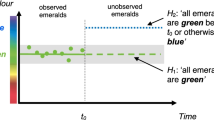Abstract
Internalism about mental content holds that microphysical duplicates must be mental duplicates full-stop. Anyone particle-for-particle indiscernible from someone who believes that Aristotle was wise, for instance, must share that same belief. Externalism instead contends that many perfectly ordinary propositional attitudes can be had only in certain sorts of physical, sociolinguistic, or historical context. To have a belief about Aristotle, for instance, a person must have been causally impacted in the right way by Aristotle himself (e.g., by hearing about him, or reading some of his works).
An interesting third view, which I call ‘weak’ internalism, is a mix of what are arguably the most plausible aspects of the two extreme views. On the one hand, the weak internalist rejects the externalist’s idea that certain propositional attitudes can be had only in certain sorts of physical, socio-linguistic, or historical context; but on the other hand, she rejects the internalist’s claim that microphysical duplicates must be mental duplicates.
One of the most vocal opponents of externalism, John Searle, defends a paradigm case of weak internalism. In this paper I explain his view and why it might seem like the ideal compromise: in particular, it captures intuitions underlying both sides of the debate. I then argue, however, that Searle’s view is untenable; and my objection shows the untenability of weak internalism in general. Despite the attractiveness of a compromise view, we must choose between internalism and externalism full-stop.
Similar content being viewed by others
References
P. Boghossian (1989) ArticleTitle’Content and Self-knowledge’ Philosophical Topics 17 5–26
T. Crane (1991) ArticleTitle’All the Difference in the World The Philosophical Quarterly. 41 IssueID162 1–25
R. Feldman (1980) ArticleTitle’Saying Different Things’ Philosophical Studies 38 79–84 Occurrence Handle10.1007/BF00354529
J. Fodor (1987) Psychosemantics: The Problem of Meaning in the Philosophy of Mind MIT Press Cambridge
G. Frege (1918/1967) ’The Thought: A Logical Inquiry’ P.F. Strawson (Eds) Philosophical Logic. OUP Oxford 17–38
Klein M. (1996). ’Externalism, Content, and Causation’. Proceedings of the Aristotelian Society 96, 159–176
E. Lepore R. Gulick ParticleVan (Eds) (1997) John Searle and His Critics Blackwell Cambridge
D. Lewis (1979) ArticleTitle’Attitudes de dicto and de se’ Philosophical Review 88 513–543
H. Noonan (1982) ArticleTitle’Fregean Thoughts’ The Philosophical Quarterly. 34 IssueID136 205–224
Perry J. (1979). ’The Problem of the Essential Indexical’, reprinted in Perry (2000). The Problem of the Essential Indexical and Other Essays (ch. 2), Stanford: CSLI
J. Searle (1983) Intentionality: An Essay in the Philosophy of Mind Cambridge University Press New York
Sosa E. (1995). ’De Re Belief, Action Explanations, and the Essential Indexical’. In: Sinnott-Armstrong W. (ed). Modality, Morality, and Belief: Essays in Honor of Ruth Barcan Marcus (pp. 235–249)
S. Yablo (1997) ArticleTitle’Wide Causation’ Philosophical Perspectives 11 251–281
Author information
Authors and Affiliations
Corresponding author
Rights and permissions
About this article
Cite this article
Newman, A.E. Two Grades of Internalism (Pass and Fail). Philos Stud 122, 153–169 (2005). https://doi.org/10.1007/s11098-004-1291-4
Issue Date:
DOI: https://doi.org/10.1007/s11098-004-1291-4




